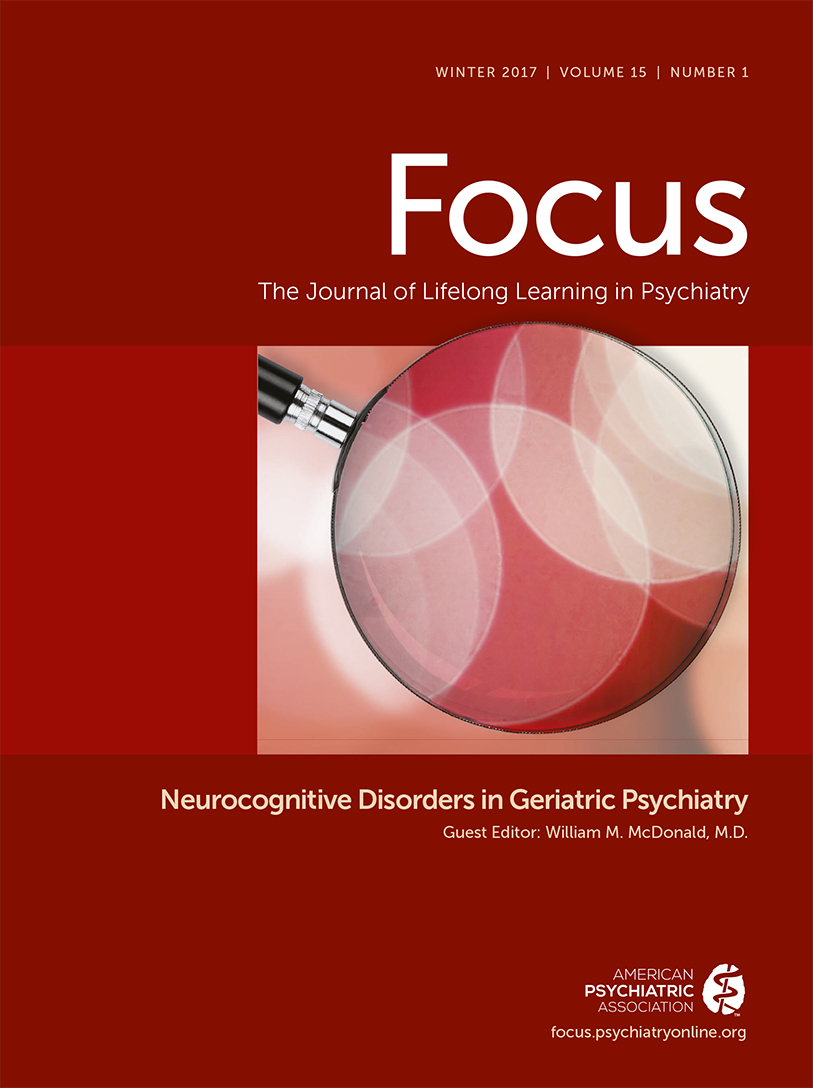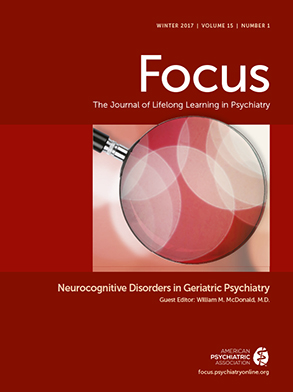Family members caring for older relatives with dementing illnesses are at greater risk of adverse health-related outcomes than are family caregivers of older adults with other health disorders (
1). Physicians are often the first contact in the health care system for most family caregivers of individuals who are diagnosed as having dementia (
2). According to Fortinsky, “physicians are in a unique position to help family caregivers reduce the risks of adverse outcomes by carefully explaining the dementia disease process, advising how to manage symptoms as they occur, and linking caregivers with appropriate community support services” (
3). The physician must skillfully engage and empower patients with dementia to optimize their participation in their health care decisions while engaging the crucial and often emotionally exhausted primary caregivers. The term
health care triad in this context includes the patient with dementia, the family caregiver, and the patient’s physician.
Each member of the health care triad brings unique sociodemographic, psychological, cultural, and health-related characteristics to the relationship (
3,
4). Any of these factors may influence the effectiveness of the triadic encounter. Mahoney and colleagues (
5) explored cross-cultural similarities and differences in African-American, Chinese, and Latino family caregivers’ perceptions of the onset and diagnosis of Alzheimer’s disease among their relatives. All three groups were noted to normalize the cognitive symptoms of their affected family member until a critical event, usually relocation, precipitated family awareness that their family member’s behavior was not the result of normal aging. The study suggested that the three groups differed in the topic of greatest concern to the caregivers when interacting with the family member’s physician. African-American caregivers more frequently noted that physicians tended to minimize or disrespect their concerns about the memory loss of their elder family member; Chinese caregivers were concerned about stigmatization within their community of the elder family member with dementia; Latino caregivers indicated that they did not want to be pressured to place their loved one in a setting outside of the home. The authors recommended providing the public with better access to discreetly presented Alzheimer’s disease information, increasing dementia awareness among community physicians, motivating clinicians to adopt culturally sensitive communication patterns, and providing community education to reduce the stigmatization of persons with Alzheimer’s and other dementing diseases.
Patient-centered doctor–patient communication, in which the physician solicits the patient’s perspective and enhances the patient’s feelings of partnership and understanding, has been demonstrated to increase patient adherence to treatment, improve satisfaction with care, and decrease patient distress (
6,
7). However, in engaging the patient and caregiver in the painful discussion about the diagnosis of dementia, physicians may fall short of optimal communication techniques. Zaleta and Carpenter (
8) studied patient-centered behaviors of physicians during the disclosure of a dementia diagnosis to the patient and caregiver. The study’s physicians most frequently used positive rapport-building behaviors, followed by facilitation of questions and patient activation, which the physicians reported using to establish a shared understanding with the patient and actively solicit the patient’s perspective. The least frequent patient-centered technique observed in the study was emotional rapport building. Many physicians seemed to struggle with expressing optimal empathic attunement in these discussions.
Communicating the diagnosis of dementia can be very difficult for the entire triad. The physician attempts to disclose the diagnosis to the patient, who may not fully comprehend the implications of a dementia diagnosis, as well as to the caregiver, who may attempt to be stoic in the company of the patient (
9). The triangular nature of this communication may complicate the interaction for the physician and interfere with attempts to empathically connect with both patient and caregiver. The study by Zaleta and Carpenter (
8) suggested that some physicians more frequently and naturally used patient-centered communication, whereas others did so less frequently. Although it is unclear how these communication styles may affect the care received, family caregivers of individuals with dementia have reported in other studies (
10,
11) that doctors did not provide adequate emotional support and social service linkages for them. Although more research needs to be done, empathic engagement with the physician treating their family member appears to be a crucial component of the triadic relationship for caregivers of a family member with dementia.
Clinical Vignette
Ms. Ramirez and her adult daughter, Silvia, sat in the waiting room. Ms. Ramirez smiled as she described what “Papa” was doing today. Silvia’s brow furrowed in concern before she finally spoke. “Mama, you know Papa is gone.”
“Gone? Where has he gone?” Ms. Ramirez inquired, confused.
“Mama, he died. Remember? Of cancer. It was two years ago.”
“Are you sure?” Ms. Ramirez queried. “I thought I saw him today.”
“No, Mama. You just get confused sometimes. It’s OK. But what you are remembering happened a long time ago.”
“Oh,” murmured Ms. Ramirez, sadness enveloping her features.
Dr. Montenegro stood quietly, listening to the interaction. She was glad she had geriatric psychiatry training. Still, it was painful. She took a deep breath and greeted them both. Ms. Ramirez was 69 years of age and had been referred to Dr. Montenegro by her primary care physician because of concerns about her sleep difficulties and memory problems. As a member of the patient-centered medical home, Dr. Montenegro frequently collaborated closely with the medical team. Ms. Ramirez had undergone blood work, magnetic resonance imaging, and basic cognitive testing to determine the nature of her failing memory. Dr. Montenegro was also providing a psychiatric evaluation for sleep disturbance and possible depression.
When they got into the office and sat down, Silvia spoke first. “Did you get the results of the tests back?”
“Yes,” Dr. Montenegro answered. She then turned her gaze to Ms. Ramirez and inquired, “Ms. Ramirez, how have you been feeling?”
“Oh, good as gold,” Ms. Ramirez answered automatically before adding with a frown toward Silvia, “But, I do get confused. Silvia keeps reminding me of that.”
“Oh, Mama. I’m sorry,” Silvia replied. “You know, since Papa died, you sometimes live in the past. I think you just really miss him.”
Test results pointed to early-stage Alzheimer’s disease. Dr. Montenegro pondered whether to review all of the results first or just give the diagnosis. She decided that they (and she) needed a little preparation. “Well, Ms. Ramirez, your tests suggest that most of your organs are healthy,” Dr. Montenegro began.
“Oh, please, call me Maria,” Ms. Ramirez interrupted.
“Maria, your heart and other organs are in good shape. And your blood work was normal,” Dr. Montenegro said.
Silvia glanced up with a look of dread.
Dr. Montenegro continued. “Ms. Ramirez—Maria—you have been grieving your husband, and I think that has affected your mood and memory. But I am saddened to say that the tests also suggest that you have the early stages of Alzheimer’s disease. Do you know what that is?”
Silvia stifled a gasp and clasped her mother’s hand. Ms. Ramirez donned a look of resolve, clutched Dr. Montenegro’s hand, and replied, “My grandmother had it, I think. Are you going to put me in a nursing home?”
“No, Mama, don’t you worry. Juan and I will take care of you,” Silvia blurted, a tear making its way down her cheek.
Dr. Montenegro gazed at them both empathically and continued to hold Ms. Ramirez’s hand as she explained the disorder—that it affects different people in different ways and that they would plan together, with the medical team, what the best treatments would be. Dr. Montenegro reassured Ms. Ramirez and her daughter that decisions would be in their hands, in collaboration with the treatment team—of which she, Dr. Montenegro, would be an integral part—to provide support, to treat sleep and mood symptoms, and “to get through this together.”

